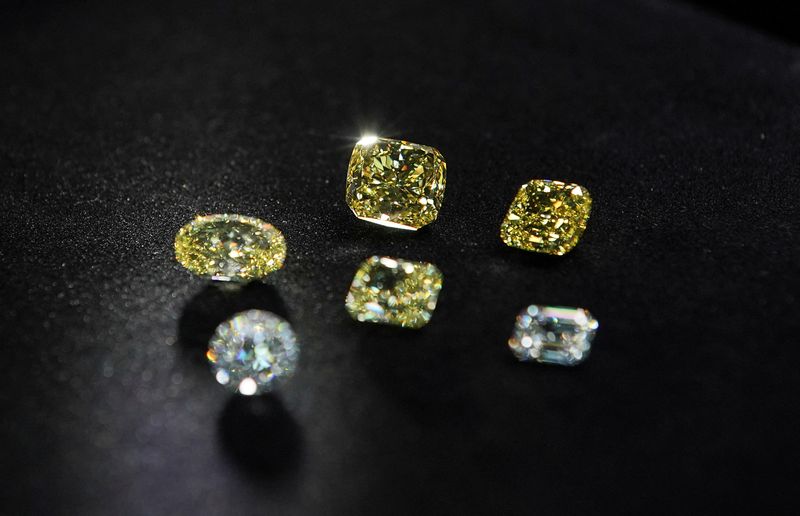By Julia Payne
BRUSSELS (Reuters) -G7 countries will this week discuss four plans to ban Russian diamonds from G7 markets from Jan. 1, from light-touch self-regulation to strict import measures, laying bare differences that explain why a ban has been so difficult to agree for more than a year, documents showed.
The four proposals were prepared by Belgium, India, a French jewellery industry group and the World Diamond Council and will be discussed at a technical meeting of Group of Seven representatives on Thursday, officials close to the talks told Reuters.
A G7 ban would hit Russian diamond exports badly because G7 countries - United States, Canada, Japan, Germany, Britain, Italy and France - account for 70% of global diamond demand.
But it would also hit supply, because Russia is the world's biggest producer of rough diamonds by volume, accounting for 30% of them.
The main task of the meeting will be to agree in a legally sound way on a definition of traceability of diamonds, to be able to determine where the stones come from.
"Part of the reason we are stalled is that ... it's an indirect ban - it's on Russian diamonds coming (into G7) from outside of Russia. It's more complicated. There's tension between keeping momentum with a political statement first or whether the technicals need to be decided in full first," one of the sources familiar with discussions asking not be named said.
"In November we absolutely need to clear things up if we want to meet the Jan. 1 start," the source said, adding that if a model is picked that requires government controls then it will take longer to push through legislation.
Agreement is tough because the details of a G7 ban could boost or deteriorate business conditions for some of the world's major diamond centres in Belgium, India, or the United States and their share of the global $87 billion natural diamond jewellery business.
The main differences between the proposals include where the diamonds enter G7 markets, how they would be verified if they originate from Russia, and what the weight thresholds would be and consequences there would be for breaking the rules.
India and Belgium want the entry point to be their own diamond centres in Mumbai and the Antwerp respectively, France's group wants multiple entry points to prevent bottlenecks and WDC wants a more self-regulating system. The weight threshold for the gems could be 1 carat or more for polished stones.
Belgium sees its reputation at stake and wants to make sure Russian gems do not circulate and fears getting stung by scandal later. It sees tracing and technology-based checks on rough diamonds as essential and best done at its Antwerp hub that already has robust requirements.
India fears putting to much of an onus on its small and medium-sized producers if a harsher model is adopted. India's federal trade ministry did not immediately respond to a request for comment.
"There are intense G7 technical calls on the traceability mechanism taking place now. We hope there can be a public announcement soon," a diplomat with knowledge of the matter said.
The EU and the G7 have been looking at a Russian diamond ban since 2022 as part of its sanctions on Moscow over its invasion of Ukraine.
The United States has already imposed sanctions on Russia's state-owned diamond producer Alrosa, but without a global ban, it seems to be little affected - in the first half of this year it reported revenue of $1.9 billion and dividends of $282 million.
De Beers, Alrosa's main competitor, said on Thursday that it supported the WDC's proposal but urged the G7 to engage Botswana, Namibia, South Africa, Angola and India to develop the framework with input from across the industry.
After Moscow launched its invasion of Ukraine in February 2022, major jewellers, such as U.S. brand Tiffany's, said they would no longer buy Russian diamonds.

But without the cooperation of India, where most of the world's stones are cut, or without Belgium, whose city of Antwerp is the world's biggest diamonds trading centre, it is impossible to make sure that gems circulating between them and Dubai or Tel Aviv are not of Russian origin.
With all the global players involved, discussions have been slow even though diamonds, along with nuclear and liquefied natural gas, are among the few remaining significant revenue streams for Moscow that Western powers have not yet imposed full sanctions upon.